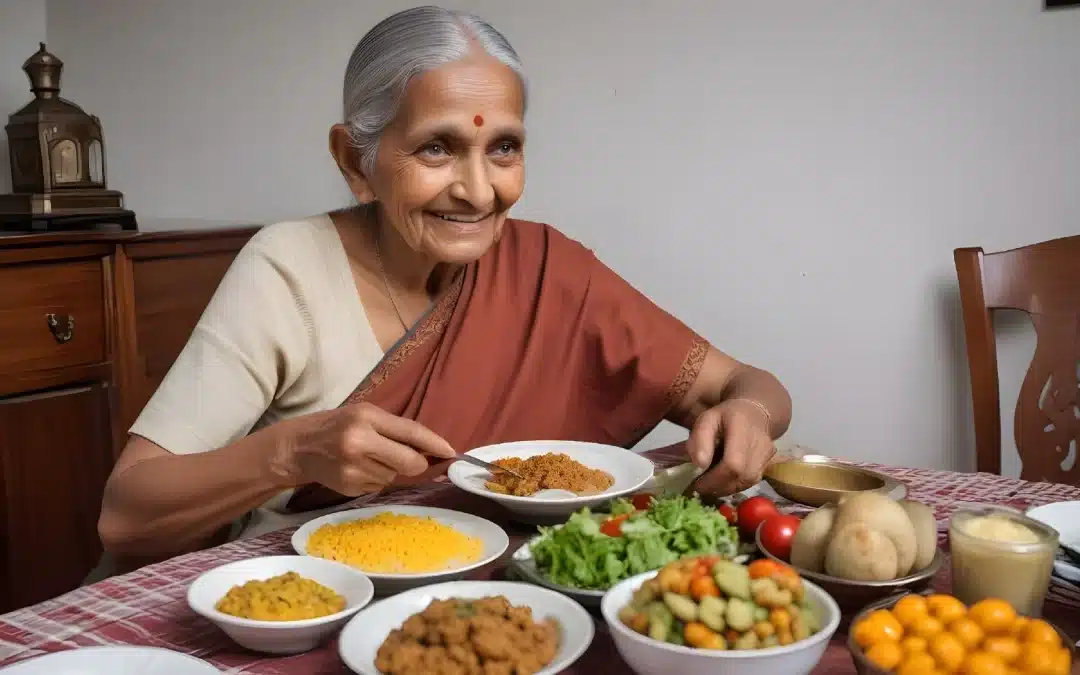Introduction:
As we age, our nutritional needs change, making it crucial to prioritize optimal nutrition for the elderly. A well-balanced diet enhances quality of life, supports mental and physical health, and prevents chronic diseases. Understanding and addressing these nutritional requirements is essential for maintaining health and vitality in the golden years.
Optimal nutrition for the elderly is key to healthy aging. Learn essential tips to support the well-being of seniors through proper diet and nutrition.
Why Optimal Nutrition for the Elderly is Crucial?
As individuals age, their bodies undergo significant physiological changes that dramatically alter their nutritional needs. Metabolism slows down, muscle mass decreases, and chronic conditions such as diabetes, heart disease, and osteoporosis begin to affect tissues. These changes make optimal nutrition not just beneficial but essential. With advancements in medical science extending lifespan, maintaining proper nutrition is key to enhancing the quality of life, promoting longevity, and reducing the risk of serious health complications. By prioritizing optimal nutrition for elderly, we can help ensure that they not only live longer but enjoy healthier, more vibrant lives.
Key Nutrients for Optimal Nutrition for the Elderly
To ensure optimal nutrition for the elderly, focusing on certain key nutrients is vital. These include:
1. Protein: Essential for maintaining muscle mass and strength. Sources include:
- Beans and legumes.
- Soy products (like tofu, tempeh, and edamame).
- Dairy (such as milk, yogurt, and cheese).
- Plant-based proteins (like lentils, chickpeas, and quinoa).
- Lean meats (such as chicken, turkey, and lean cuts of beef).
- Fish (like salmon, tuna, and sardines).
2. Calcium: Crucial for bone health. Sources include:
- Dairy products (such as milk, yogurt, and cheese).
- Leafy greens (like kale, collard greens, and spinach).
- Fortified foods (such as fortified cereals and orange juice).
- Drumstick (Moringa) leaves.
- Sesame seeds, almonds, tofu, and sardines.
3. Fiber: Supports digestive health and can help prevent constipation. Sources include:
- Whole grains (like oats, barley, and whole wheat).
- Fruits (such as apples, berries, and oranges).
- Vegetables (like broccoli, carrots, and Brussels sprouts).
- Legumes (such as lentils, beans, and peas).
- Nuts and seeds (like almonds, chia seeds, and flaxseeds).
4. Omega-3 Fatty Acids: Promote heart and brain health. Sources include:
- Fatty fish (like salmon, mackerel, and trout).
- Flaxseeds and chia seeds.
- Walnuts and pumpkin seeds.
5. B Vitamins: Important for energy production and cognitive function. Sources include:
- Vitamin B1:Found in whole grains (like wheat, barley, and oats), nuts, seeds, and beans.
- Vitamin B2: Abundant in dairy products (such as milk and yogurt), eggs, almonds, and leafy greens.
- Vitamin B3: Found in poultry (like chicken and turkey), fish (such as tuna and salmon), peanuts, and legumes.
- Vitamin B6 : Rich sources include bananas, potatoes, chickpeas, and fortified cereals.
- Vitamin B9: Found in leafy greens (like spinach and kale), asparagus, citrus fruits, and avocadoes.
- Vitamin B12: Mainly found in animal products (such as meat, fish, and dairy), fortified foods (like cereals and plant-based milk), and nutritional yeast.
Challenges in Maintaining Optimal Nutrition for the Elderly
Several factors can make it challenging to achieve optimal nutrition for the elderly:
- Appetite Changes: Aging can diminish the sense of taste and smell, leading to reduced appetite.
- Dental Issues: Poor dental health can make chewing difficult, limiting food choices.
- Chronic Illnesses: Conditions like arthritis, diabetes, and heart disease can affect nutritional needs and food intake.
- Medications: Some medications can interfere with nutrient absorption or appetite.
Tips to Achieve Optimal Nutrition for the Elderly
Here are practical tips to ensure optimal nutrition for the elderly:
- Balanced Meals: Include a variety of nutrient-dense foods from all food groups.
- Hydration: Encourage regular water intake to prevent dehydration, which is common in older adults.
- Small, Frequent Meals: This can help manage appetite changes and ensure adequate nutrient intake.
- Adapted Food Textures: Soft or pureed foods can be easier to eat for those with dental issues.
- Supplements: Consider supplements for nutrients that are hard to obtain from food alone, such as vitamin D or calcium, but always consult with a healthcare provider first.
How KITES Senior Care Ensures Optimal Nutrition for the Elderly.
At KITES Senior Care, caregivers play a pivotal role in maintaining optimal nutrition for the elderly. They ensure that seniors receive the necessary nutrients to support their overall well-being. Here’s how caregivers at KITES Senior Care contribute:
- Personalized Meal Planning and Preparation: Tailoring meal plans to meet individual dietary needs and preferences, ensuring balanced and nutrient-dense meals.
- Monitoring Nutritional Intake: Tracking dietary habits and adjusting as needed to address any deficiencies or changes in appetite.
- Encouraging Hydration: Reminding and assisting seniors to drink enough fluids throughout the day to prevent dehydration.
- Adapting Food Textures: Modifying food textures to make meals easier to eat while still being nutritious for those with chewing and swallowing difficulties.
- Supplement Management: Coordinating with healthcare providers to incorporate necessary dietary supplements, ensuring essential vitamins and minerals are received.
- Promoting Physical Activity: Encouraging regular physical activity to boost overall health, stimulate appetite, and support better digestion.
- Education and Advocacy: Educating seniors and their families about the importance of nutrition and advocating for their dietary needs in various settings.
Conclusion
With a successful record of delivering geriatric care to over 5,400 families and providing more than 90,000 nursing days, we are dedicated to ensuring top-quality care. Our facilities include over 160 assisted care beds and 340 specialized care beds, spanning across 3 cities. Whether in our Geriatric Care Centres or at home senior care services, we prioritize delivering exceptional care to seniors in need.
Connect with us and talk to our expert for guidance or write to us at hello@kitesseniorcare.com or visit the KITES senior care centre nearby today.

